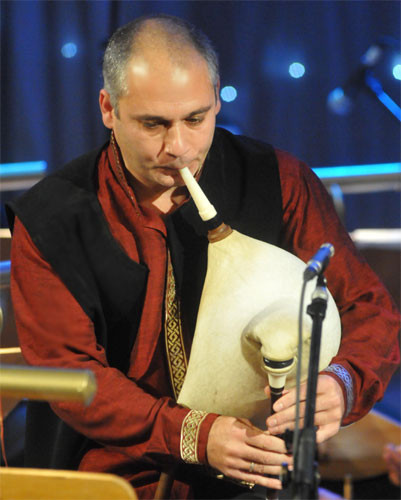Renowned Bulgarian bagpiper Petyo Kostadinov celebrates his 50th birth anniversary in 2018. Petyo Kostadinov is a skillful instrumentalist with remarkable playing technique, a successful interpreter of traditional horo chain dances and tunes and author of interesting compositions. He is a skillful performer of ancient folklore styles, but is constantly experimenting with new instrumental approaches and techniques. He took part at various local and international music projects. Petyo Kostadinov studied at the National School of Folk Arts Philip Kutev in the town of Kotel and the Academy of Music, Dance and Fine Arts in Plovdiv. He gained huge music experience at Trakia Folklore Ensemble. Later, he became a member of the Bulgarian National Radio Folk Orchestra and today is among its most-celebrated soloists.
 I grew up in a family that loved to listen to folk music. I had no choice and listened to that music only. My maternal grandfather used to play on the bagpipe. He was the person who taught me how to hold the bagpipe and play on this music instrument. Later, I joined a music school in the village of Samuilovo (Sliven district) in the classes of Dobri Seliminovski who prepared me for the National School of Folk Arts Philip Kutev in Kotel. There, I studied in the classes of Dinio Marinov and Kolyo Sofenkov (may their souls rest in peace) as well as in the classes of two other excellent music pedagogues. We studied the pieces of renowned Bulgarian bagpipers Kostadin Varimezov, Nikola Atanasov, Shahpas Saliev, Stoyan Popov (Popeto). When I graduated from the National School of Folk Arts Philip Kutev in Kotel I had the opportunity to lecture at that music school for several years. I am happy that some of my students are currently working at the Trakia Folklore Ensemble, at the Academy of Music, Dance and Fine Arts in Plovdiv, etc. I myself worked at the Trakia Folklore Ensemble for 8 years. We held many concerts in Bulgaria and abroad and it was a great experience. Later, I moved with my family to Sofia and I have been working at the Bulgarian National Radio Folk Orchestra since 2001. I started to write pieces since then. Currently I am working over new playing methods and techniques. I play with two chanters in Gaida Avasi piece and I do the same in BULGARA instrumental band. I feel free when I play at that music band and we have great fun with my colleagues there. The music of BULGARA band is a combination of Bulgarian folklore, rock, jazz and other music styles. We play mainly in music clubs and at music festivals in Bulgaria and Europe. In 2003 and 2004 we had the pleasure to play alongside world-acclaimed musician Milcho Leviev at Bulgaria hall. In 2005 BULGARA was a support band of world-famous guitarist Al Di Meola at the National Palace of Culture in Sofia.
I grew up in a family that loved to listen to folk music. I had no choice and listened to that music only. My maternal grandfather used to play on the bagpipe. He was the person who taught me how to hold the bagpipe and play on this music instrument. Later, I joined a music school in the village of Samuilovo (Sliven district) in the classes of Dobri Seliminovski who prepared me for the National School of Folk Arts Philip Kutev in Kotel. There, I studied in the classes of Dinio Marinov and Kolyo Sofenkov (may their souls rest in peace) as well as in the classes of two other excellent music pedagogues. We studied the pieces of renowned Bulgarian bagpipers Kostadin Varimezov, Nikola Atanasov, Shahpas Saliev, Stoyan Popov (Popeto). When I graduated from the National School of Folk Arts Philip Kutev in Kotel I had the opportunity to lecture at that music school for several years. I am happy that some of my students are currently working at the Trakia Folklore Ensemble, at the Academy of Music, Dance and Fine Arts in Plovdiv, etc. I myself worked at the Trakia Folklore Ensemble for 8 years. We held many concerts in Bulgaria and abroad and it was a great experience. Later, I moved with my family to Sofia and I have been working at the Bulgarian National Radio Folk Orchestra since 2001. I started to write pieces since then. Currently I am working over new playing methods and techniques. I play with two chanters in Gaida Avasi piece and I do the same in BULGARA instrumental band. I feel free when I play at that music band and we have great fun with my colleagues there. The music of BULGARA band is a combination of Bulgarian folklore, rock, jazz and other music styles. We play mainly in music clubs and at music festivals in Bulgaria and Europe. In 2003 and 2004 we had the pleasure to play alongside world-acclaimed musician Milcho Leviev at Bulgaria hall. In 2005 BULGARA was a support band of world-famous guitarist Al Di Meola at the National Palace of Culture in Sofia.
The concerts with the BNR Folk Orchestra are always great experience. I owe everything to the bagpipe and would like to advise the young Bulgarian bagpipers to adhere to its old style and upgrade from there onwards.
English version: Kostadin Atanasov
On 22 November, the Association of Bulgarian Folk Ensembles Abroad (ABFEA) will present its project, 'Online Catalogue of Bulgarian Horo and Other Dances', in three European cities: Lyon, Munich and Copenhagen. 'Our goal is to preserve Bulgarian..
‘The Bulgarian horo is a kind of magic — an enchanted circle that pulses with the unique energy of our spirit, our traditions and our identity,’ says journalist Milena Milotinova, who recently presented her new documentary The Magic of the Bulgarian..
The Eastern Rhodopes come to life in the heart of Sofia – with authentic flavoуrs, music and craftsmanship . Residents of the Bulgaria capital have a chance to immerse themselves in the atmosphere of Momchilgrad Municipality and its cultural and natural..

+359 2 9336 661
